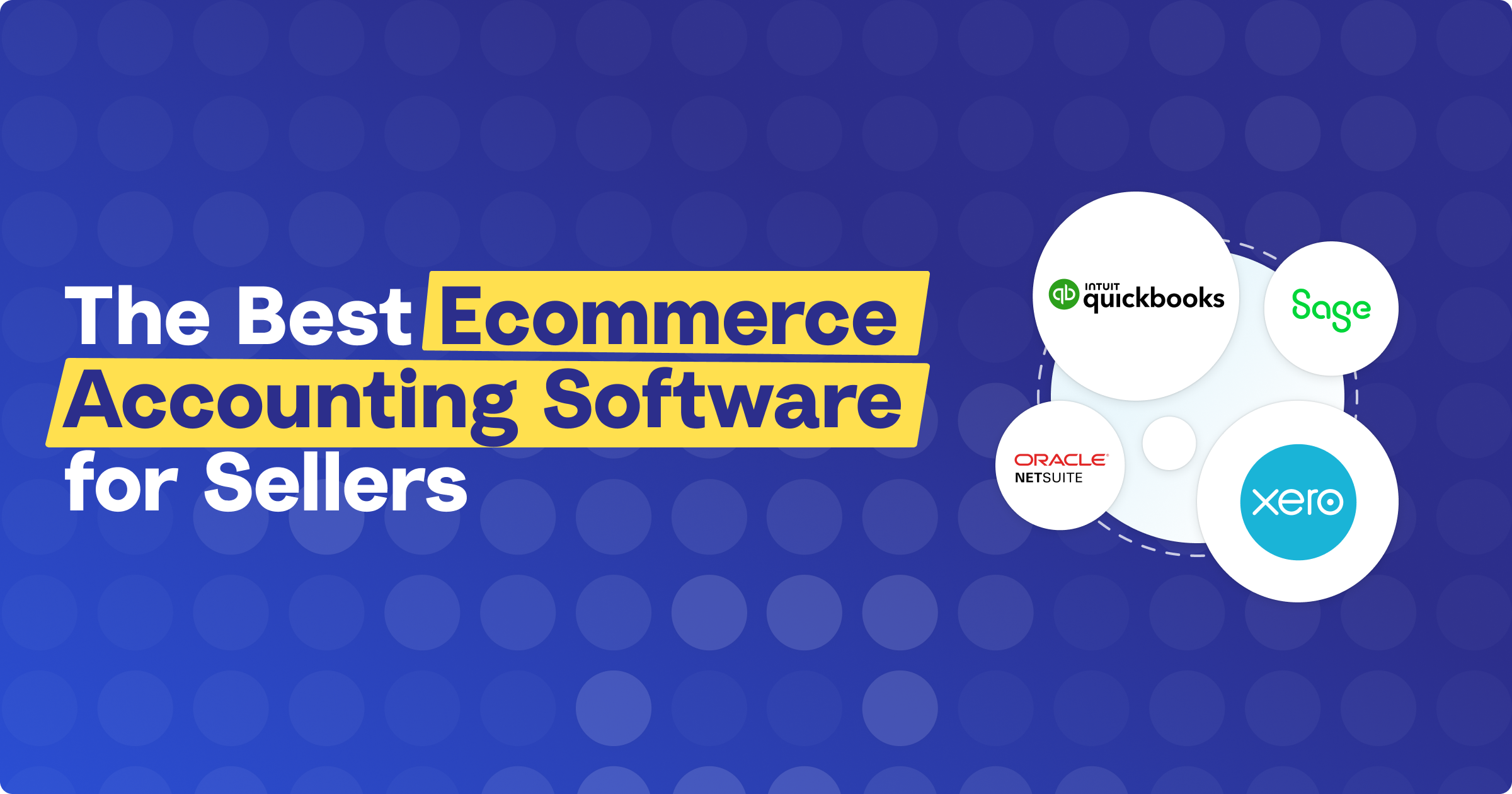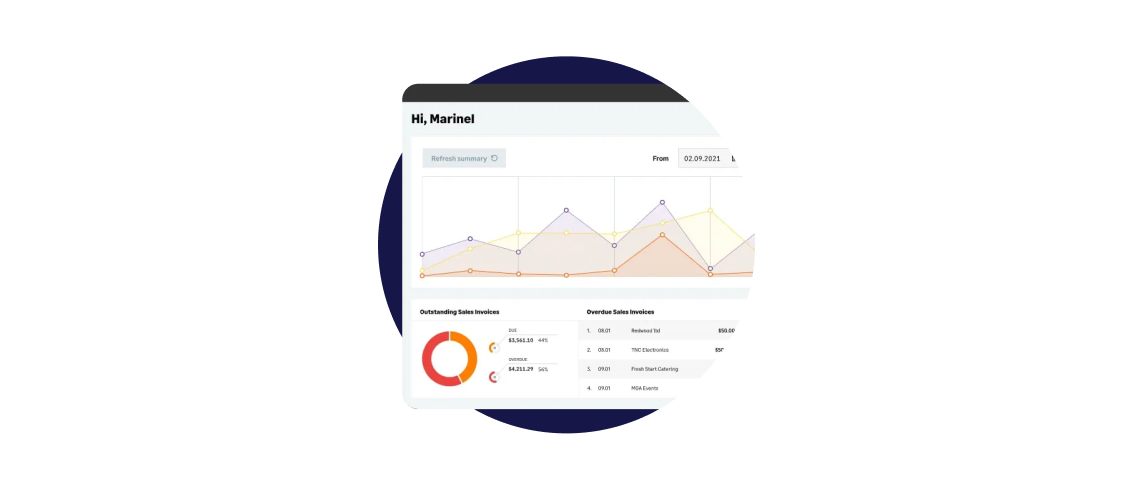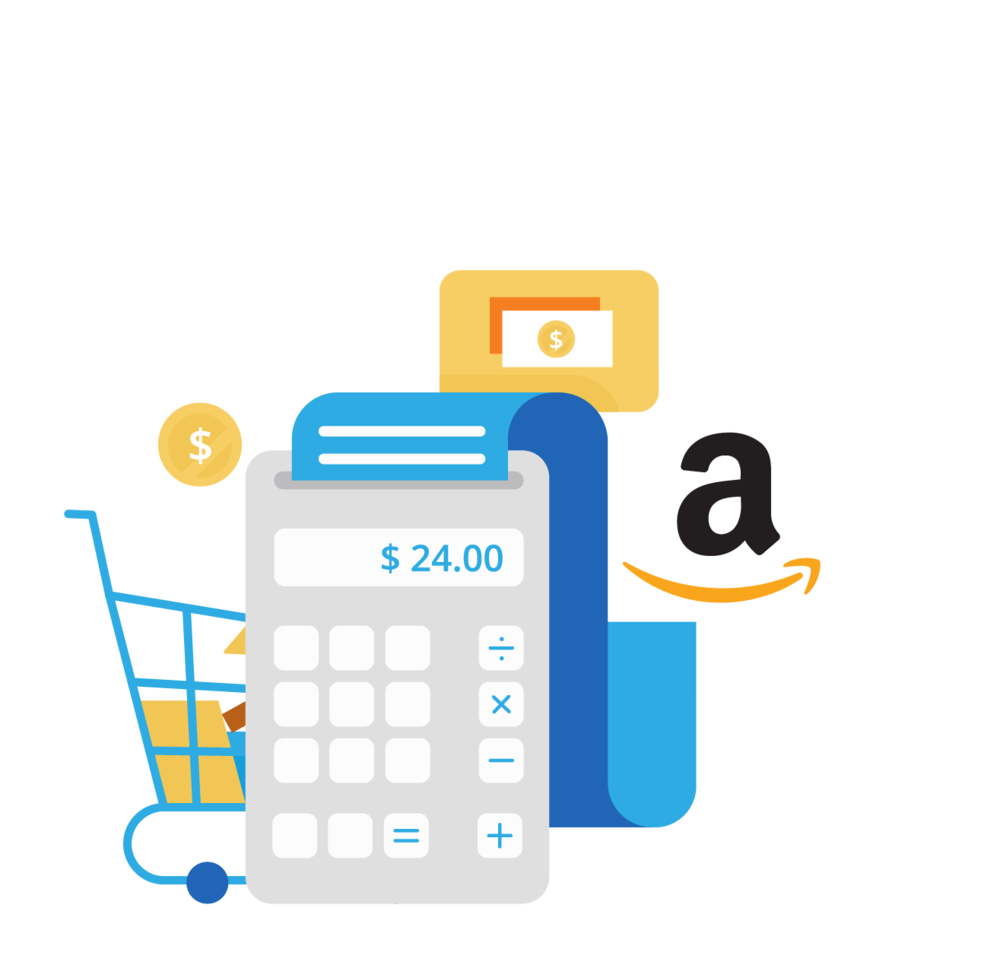Top 5 Best Ecommerce Accounting Software in 2025

You’ve likely found this post due to one of two reasons:
- You’ve started an ecommerce business, are growing, and thinking about your accounting and taxes. Congrats!
- You’ve been selling on Shopify, Amazon, eBay, Etsy, Walmart, and/or other online sales channels, and you’re finding that your current accounting system can’t support the complexities that come with ecommerce.
Good news! As ecommerce accounting technologists, we’ll use this post to walk you through what’s available in the market today, plus key considerations depending on your type of business. We’ll also outline integration apps that help make the ecommerce accounting process smoother and more automated.
If you want advice on the best ecommerce accounting software for your business from a certified ecommerce accounting professional, you can find one on the A2X Directory.
Key takeaways
- The right ecommerce accounting software depends on your business needs. QuickBooks Online, Xero, Sage, and NetSuite each have strengths depending on your business’s characteristics. Matching the right software to your business size and complexity ensures long-term efficiency.
- Scalability matters, so choose software that grows with you. You might not be selling on multiple channels or in multiple geographies today, but if you plan on expanding your business, it’s important to pick accounting software that handles your growing needs, whether multi-currency support, global tax compliance, inventory management, and more.
- Integrations make or break your workflow. Even the best accounting software benefits from automation. Tools like A2X eliminate manual reconciliation, streamline sales tax tracking, and ensure accurate cost-of-goods reporting, saving you hours every month and giving you confidence in your numbers.
- Cost vs. value – Pick a tool that won’t hold you back. Wave and Zoho work for small sellers, but growing businesses need the robust features of QuickBooks, Xero, or NetSuite. Investing in the right platform early prevents costly migrations later.
Table of Contents
Save hours on your ecommerce accounting
A2X connects your sales channels and accounting software for fast and accurate monthly bookkeeping.
Try A2X today

QuickBooks Online (QBO) for ecommerce
Why QuickBooks Online stands out
- Extensive Ecosystem. QuickBooks’ large marketplace of apps and connectors, including A2X, supports diverse ecommerce needs from syncing sales to automating bank reconciliations.
- Familiar and Widely Supported. Many accountants and bookkeepers specialize in QuickBooks, making it easier to find help or outsource tasks.
- Scalable Plans. QuickBooks offers multiple plan tiers, from entry-level to advanced, allowing businesses to scale seamlessly without switching platforms or sacrificing performance.
Who it’s well suited for
- North American ecommerce sellers who want an established, cloud-based solution that can grow with their business.
- Owners seeking a broad support network of ProAdvisors and online resources.
- Multi-channel merchants who plan to integrate data from Amazon, eBay, Walmart, and beyond through tools like A2X.
Ecommerce tip: Summarizing transactions via A2X helps avoid pushing thousands of Amazon, Shopify, and other channels’ individual orders into QuickBooks. This keeps your accounting file clean while still capturing every detail, including fees, refunds, and taxes for better visibility on your Profit & Loss Statement (P&L).

Xero for ecommerce
Why Xero stands out
- Modern, Easy-to-Use Interface. Xero is known for its clean, intuitive design that simplifies financial tasks, making it a great choice for business owners who want powerful features without a steep learning curve.
- Global and Multi-Currency Friendly. Designed with international commerce in mind, Xero updates exchange rates automatically for smooth cross-border transactions.
- Built-in Tax Support for Multiple Regions. Xero includes robust functionality for GST (Australia, New Zealand, Canada), VAT (UK, Europe), and U.S. sales tax, making it easier to manage tax compliance across different jurisdictions.
- Flexible App Ecosystem. Over a thousand integrations, including connectors like A2X for Amazon, Shopify, eBay, Etsy, Walmart, PayPal, and more.
Who it’s well suited for
- Businesses that value a modern, user-friendly interface with less traditional accounting jargon.
- International or rapidly expanding sellers looking to handle multiple currencies.
- Team-based operations where multiple staffers need concurrent access.
Ecommerce tip: Using A2X to integrate Amazon, Shopify and other sales channels with Xero ensures that payouts are broken down into fees, refunds, shipping, and taxes. This keeps your books tidy and easy to reconcile.

Sage Business Cloud Accounting for ecommerce
Why Sage Business Cloud stands out
- Robust Inventory Management. Ideal for sellers with extensive product catalogs, multiple SKUs, or more detailed stock control needs.
- Trusted roots in the UK/Europe. Sage’s long history supports compliance like VAT and regional accounting standards.
- Customizable Workflows. Offers flexibility to adapt to various types of product-based businesses.
Who it’s well suited for
- UK and Europe-based ecommerce merchants who want reliable accounting plus inventory features.
- Businesses needing deeper stock or order management than entry-level accounting tools typically provide.
- Merchants that prefer a traditional approach but still want cloud convenience and integrations.
Ecommerce tip: Use a connector like A2X to automatically sync multi-channel sales data with Sage. This eliminates manual data entry and ensures accurate cost-of-goods tracking, making it easier to manage inventory and profitability.

Oracle NetSuite for ecommerce
Why Oracle NetSuite stands out
- All-in-One ERP. NetSuite goes beyond standard accounting, covering order management, CRM, inventory, and more in one unified system.
- Enterprise-Level Scalability. Built for operations that span multiple regions, subsidiaries, or sales channels.
- Highly Customizable. Tailor reports, workflows, and automations to match complex financial or supply chain processes.
Who It’s Well Suited For
- Large and fast-scaling brands with high transaction volumes and advanced operational needs.
- Businesses requiring global compliance or multi-entity consolidation.
- Teams prepared to invest in an ERP that can manage growth for the long haul.
Ecommerce tip: NetSuite integrates with Amazon, Shopify, and other channels, including via A2X, to accurately automate payout reconciliation. This is helpful if your brand sells across multiple marketplaces at scale.
Other notable accounting solutions for ecommerce
Some businesses start with lighter-weight tools before upgrading to more powerful accounting software. Here are a few:
- FreshBooks. Simple invoicing and expense tracking, but less built-in ecommerce functionality.
- Wave. Free for very small businesses, but lacks inventory and marketplace integrations.
- Zoho Books. Affordable and integrates well within Zoho’s suite, but limited in ecommerce app support.
- FreeAgent. Common for freelancers in the UK.
Most ecommerce businesses with over $100,000 in sales and growing typically find QuickBooks, Xero, Sage, or NetSuite, combined with automation tools like A2X, provide a more scalable long-term solution.
The best ecommerce accounting software leans into integrations
Why picking the right integration app matters
If you sell on multiple platforms like Shopify, Amazon, eBay, Etsy, and Walmart, you’ll quickly find that reconciling payouts manually is time-consuming and frustrating. If you’ve ever looked at an Amazon settlement summary, with hundreds of transactions and transaction types, you know how difficult it is to match every fee, refund, and tax to the right category.
Luckily, integration apps like A2X automate this process, eliminating manual data entry and potential accounting errors. Instead of sorting through endless spreadsheets, your sales, fees, and deposits are automatically summarized and posted to your accounting system, keeping your books accurate and tax-ready.
Native vs. Specialized integrations for ecommerce
Some accounting platforms provide direct integrations for ecommerce sellers with lower transaction volumes. These native connectors work if you’re only selling on one platform and have a limited number of monthly transactions.
However, if you’re planning to scale your ecommerce business or sell on multiple channels, native integrations often fall short. They don’t fully categorize fees, taxes, or refunds, leading to manual adjustments and missing financial data.
A specialized tool like A2X solves this by automatically categorizing every transaction, ensuring that your books match your deposits down to the penny.
Why leading businesses, accountants, and bookkeepers trust A2X
✅ Accurate Summaries
A2X consolidates marketplace transactions into clean, organized summaries that include sales, refunds, fees, gift cards, and taxes. Instead of hundreds or thousands of transactions clogging up your books, you get neat, categorized journal entries that match the deposits on your bank feed and that are easy to reconcile.
✅ Full Automation
A2X eliminates manual data entry by working in the background. It automatically fetches your payouts, breaks down the transaction details, and posts them to QuickBooks, Xero, Sage, or NetSuite. No spreadsheets, no guesswork, just accurate accounting.
✅ Better Insights
With properly categorized financial data, you can easily analyze revenue, costs, and tax liabilities. Your Profit & Loss Statement (P&L) will always reflect the correct numbers, giving you confidence in your financial decisions.
Frequently asked questions (FAQ)
1. Do I need specialized accounting software for ecommerce?
While general accounting tools work, ecommerce businesses often benefit from software with multi-currency support, inventory tracking, and sales channel integrations.
2. Which software is best for multi-channel sellers?
QuickBooks and Xero work well for small to mid-sized sellers. Sage is ideal for inventory-heavy businesses, while NetSuite is best for large, complex operations. Regardless of which platform you choose, an integration app like A2X ensures that payout reconciliation is automated and accurate.
3. How can I handle Amazon’s two-week settlement cycles?
A2X automatically breaks down Amazon payouts into sales, fees, refunds, and taxes in the period in which they occur. This ensures your books reflect transactions at the right time rather than lumping everything into one entry when the payout arrives.
4. Should I choose Sage or Xero for VAT compliance in the UK?
Both offer strong VAT capabilities. Sage has a long-standing presence in the UK, while Xero provides a modern, user-friendly interface with extensive integrations.
5. Can I start with Wave or FreshBooks?
You can, but scaling businesses often find that switching to QuickBooks, Xero, Sage, or NetSuite is necessary as operations grow. These platforms offer better integrations and automation to handle multi-channel ecommerce efficiently.
Accurately automate your ecommerce accounting with A2X
Choosing the right accounting software is essential for growing ecommerce businesses, especially for those in need of compliance AND financial visibility. Whether you need the versatility of QuickBooks or Xero, a stock-heavy solution like Sage, or an enterprise-grade ERP like NetSuite, pairing it with A2X ensures accurate, automated ecommerce accounting that you can actually trust.
✅ Ready to streamline your ecommerce accounting?
Regardless of the accounting software you choose, try A2X for free and see how automated payout reconciliation can save time, eliminate errors, give you financial visibility, and keep your books tax-ready.
Save hours on your ecommerce accounting
A2X connects your sales channels and accounting software for fast and accurate monthly bookkeeping.
Try A2X today


